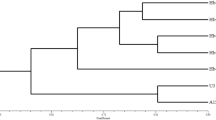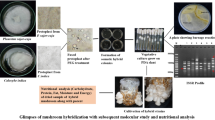Abstract
The development of fast-growing/short cropping period oyster mushroom (Pleurotus species) having good taste is one of the important needs of mushroom growers. Pleurotus djamor strain woody1, collected recently from the dead wood, has a short cropping period of 30 days but a moderately acceptable taste. One of the cultivated Pleurotus spp., P. djamor strain MDU1, has good taste but a long cropping period of 47 days. Thus, genetic improvement of P. djamor was carried out between these two strains by pairing monokaryons (anastomosis) to develop elite hybrid strains having a short cropping period and good taste. Monokaryons of parental strains showed variation in time required for germination; i.e., basidiospores of P. djamor strain woody1 germinated and developed monokaryotic colonies in 6 days, whereas that of P. djamor strain MDU1 developed monokaryotic colonies in 8 days of incubation. In addition, variation in the growth rate and morphology of the monokaryotic mycelia of both parental strains was noticed, and fast-growing monokaryons were selected for anastomosis. Out of 60 crosses made between mycelia of monokaryotic isolates of both parental strains, 20 crosses showed clamp connection, indicating that they were successful crosses. Out of 20 hybrids, two hybrid strains, viz., W2M4 and W4M4, exhibited higher yields than their parents. They exhibited the short cropping period trait, good taste attribute, and some specific volatile metabolites. This study showed that the developed two hybrid varieties, having desirable agronomic traits, could be used in mushroom farming to increase the mushroom grower’s income.






Similar content being viewed by others
Data availability
All data generated or analysed during this study are included in this article.
References
Adebayo EA, Oloke JK, Yadav A et al (2013) Improving yield performance of Pleurotus pulmonarius through hyphal anastomosis fusion of dikaryons. World J Microbiol Biotechnol 29:1029–1037. https://doi.org/10.1007/s11274-013-1266-8
Akindahunsi AA, Oyetayo FL (2006) Nutrient and anti-nutrient distribution of edible mushroom, Pleurotus tuber-regium (fries) singer. LWT Food Sci and Technol 39:548–553. https://doi.org/10.1016/j.lwt.2005.04.005
Alam N, Amin R, Khan A et al (2008) Nutritional analysis of cultivated mushrooms in Bangladesh - Pleurotus ostreatus Pleurotus sajor-caju Pleurotus florida and Calocybe indica. Mycobiology 36(4):228. https://doi.org/10.4489/MYCO.2008.36.4.228
AOAC (2012) Official Methods of Analysis of AOAC INTERNATIONAL, 19th edn. AOAC International, Gaithersburg, MD, USA
Aparna V, Dileep KV, Mandal PK et al (2012) Anti-inflammatory property of n-hexadecanoic acid: Structural evidence and kinetic assessment: Anti-Inflammatory property of n-hexadecanoic acid. Chem Biol Drug Des 80:434–439. https://doi.org/10.1111/j.1747-0285.2012.01418.x
Avin FA, Bhassu S, Rameeh V et al (2016) Genetics and hybrid breeding of Pleurotus pulmonarius: heterosis, heritability and combining ability. Euphytica 209:85–102. https://doi.org/10.1007/s10681-016-1638-x
Bamigboye CO, Oloke JK, Dames JF (2019) Development of high yielding strain of Pleurotus tuber-regium: fructification, nutritional and phylogenetic studies. J Food Sci Technol 56:3597–3608. https://doi.org/10.1007/s13197-019-03786-7
Chai R, Qiu C, Liu D et al (2013) β-Glucan synthase gene overexpression and β-glucans overproduction in Pleurotus ostreatus using promoter swapping. PLoS ONE 8:e61693. https://doi.org/10.1371/journal.pone.0061693
Chakraborty U, Sikdar SR (2008) Production and characterization of somatic hybrids raised through protoplast fusion between edible mushroom strains Volvariella volvacea and Pleurotus florida. World J Microbiol Biotechnol 24:1481–1492. https://doi.org/10.1007/s11274-007-9630-1
Das P, Sikdar SR, Samanta A (2021) Nutritional analysis and molecular characterization of hybrid mushrooms developed through intergeneric protoplast fusion between Pleurotus sajor-caju and Calocybe indica with the purpose to achieve improved strains. World J Microbiol Biotechnol 37:69. https://doi.org/10.1007/s11274-021-03032-3
Girmay Z, Gorems W, Birhanu G, Zewdie S (2016) Growth and yield performance of Pleurotus ostreatus (Jacq. Fr.) Kumm (oyster mushroom) on different substrates. AMB Express 6(1). https://doi.org/10.1186/s13568-016-0265-1
Gupta B, Niranjan Reddy BP, Kotasthane AS (2011) Molecular characterization and mating type analysis of oyster mushroom (Pleurotus spp.) using single basidiospores for strain improvement. World J Microbiol Biotechnol 27:1–9. https://doi.org/10.1007/s11274-010-0419-2
Hamad D, El-Sayed H, Ahmed W et al (2022) GC–MS Analysis of potentially volatile compounds of Pleurotus ostreatus polar extract: In vitro antimicrobial, cytotoxic, immunomodulatory, and antioxidant activities. Front Microbiol 13:834525. https://doi.org/10.3389/fmicb.2022.834525
Hasan HA, Almomany AM, Hasan S, Al-Abdallat AM (2018) Assessment of Genetic Diversity among Pleurotus spp. Isolates from Jordan. J Fungi 4:52. https://doi.org/10.3390/jof4020052
Hu R, Zhao H, Xu X et al (2021) Bacteria-driven phthalic acid ester biodegradation: Current status and emerging opportunities. Environ Int 154:106560. https://doi.org/10.1016/j.envint.2021.106560
Kaur J, Sodhi HS, Kapoor S (2008) Breeding of Pleurotus florida (oyster mushroom) for phenotypic pigmentation and high yield potential. J Sci Food Agric 88:2676–2681. https://doi.org/10.1002/jsfa.3389
Kim MK, Ryu J-S, Lee Y-H, Kim H-R (2013) Breeding of a long shelf-life strain for commercial cultivation by mono–mono crossing in Pleurotus eryngii. Sci Hortic 162:265–270. https://doi.org/10.1016/j.scienta.2013.08.028
Kim B-R, Kim HM, Jin CH et al (2020) Composition and antioxidant activities of volatile organic compounds in radiation-bred Coreopsis cultivars. Plants 9:717. https://doi.org/10.3390/plants9060717
Kuforiji OO, Fasidi IO (2009) Biodegradation of agro-industrial wastes by a edible mushroom Pleurotus tuber-regium (Fr.). J Environ Biol 30:355–358
Li Y, Liu J, Wang G et al (2019) De novo transcriptome analysis of Pleurotus djamor to identify genes encoding CAZymes related to the decomposition of corn stalk lignocellulose. J Biosci Bioeng 128:529–536. https://doi.org/10.1016/j.jbiosc.2019.04.011
Liu Z, Zhang K, Lin J-F, Guo L-Q (2011) Breeding cold tolerance strain by chemical mutagenesis in Volvariella volvacea. Sci Horti 130:18–24. https://doi.org/10.1016/j.scienta.2011.06.020
Liu X-R, Liu S-R, Ye L-Y, Wu X-P (2020) Breeding and fruiting evaluation of new strains by the interspecific mating of the high commercial potential mushroom Pleurotus tuoliensis with its closely related P eryngii. Sci Horti 271:109489. https://doi.org/10.1016/j.scienta.2020.109489
Otieno OD, Onyango C, Onguso JM et al (2015) Genetic diversity of Kenyan native oyster mushroom (Pleurotus). Mycologia 107:32–38. https://doi.org/10.3852/13-186
Oviya R, Sobanbabu G, Anbazhagan P et al (2022) Studying soil ecology and growth conditions of Phellorinia herculeana, a Wild Edible Mushroom. Processes 10:1797. https://doi.org/10.3390/pr10091797
Peng W, Lin Z, Chang J et al (2013) Biomedical molecular characteristics of YBSJ extractives from Illicium Verum fruit. Biotechnol Biotechnol Equip 27:4311–4316. https://doi.org/10.5504/BBEQ.2013.0105
Peryam DR, Pilgrim FJ (1957) Hedonic scale method of measuring food preferences. Food Technol 11:9–14
Phat C, Moon B, Lee C (2016) Evaluation of umami taste in mushroom extracts by chemical analysis, sensory evaluation, and an electronic tongue system. Food Chem 192:1068–1077. https://doi.org/10.1016/j.foodchem.2015.07.113
Raman J, Jang K-Y, Oh Y-L et al (2021) Cultivation and nutritional value of prominent Pleurotus spp.: An overview. Mycobiology 49:1–14. https://doi.org/10.1080/12298093.2020.1835142
Reihana R, Praveen T, Kumaresan P, Ramamoorthy V (2018) Studies on yield attributes of new Pleurotus djamor isolate KKM1. Mushroom Res 27:145–150
Rosnina AG, Tan YS, Abdullah N, Vikineswary S (2016) Morphological and molecular characterization of yellow oyster mushroom, Pleurotus citrinopileatus, hybrids obtained by interspecies mating. World J Microbiol Biotechnol 32:18. https://doi.org/10.1007/s11274-015-1959-2
Shang J, Xu S, Tang L, et al (2023) Transformation of compatible mating-type genes in monokaryons triggers Fruiting Body Development by Activating Mating Pathways in Pleurotus eryngii. Microbiol Spectr e05272–22. https://doi.org/10.1128/spectrum.05272-22
Sindhu S, Theradimani M, Ramamoorthy V et al (2022) Cropping duration and non-rhizomorphic mycelial phenotype of Pleurotus djamor woody1 co-segregate in the hybrid progenies. J Hortl Sci 17:220–231
Tagkouli D, Bekiaris G, Pantazi S et al (2021) Volatile profiling of Pleurotus eryngii and Pleurotus ostreatus mushrooms cultivated on agricultural and agro-industrial by-products. Foods 10:1287. https://doi.org/10.3390/foods10061287
Yoav S, Salame TM, Feldman D et al (2018) Effects of cre1 modification in the white-rot fungus Pleurotus ostreatus PC9: altering substrate preference during biological pretreatment. Biotechnol Biofuels 11:212. https://doi.org/10.1186/s13068-018-1209-6
Younis AM, Yosri M, Stewart JK (2019) In vitro evaluation of pleiotropic properties of wild mushroom Laetiporus sulphureus. Ann Agric Sci 64:79–87. https://doi.org/10.1016/j.aoas.2019.05.001
Yu X, Zhao M, Liu F et al (2013) Identification of 2,3-dihydro-3,5-dihydroxy-6-methyl-4H-pyran-4-one as a strong antioxidant in glucose–histidine Maillard reaction products. Food Res Int 51:397–403. https://doi.org/10.1016/j.foodres.2012.12.044
Acknowledgements
The authors would like to thank Tamil Nadu Agricultural University for providing facilities to carry out the research.
Funding
The authors have not disclosed any funding.
Author information
Authors and Affiliations
Contributions
Conceptualization, VR, and MT; methodology, SS, VR, MP, and SV; validation, VR, MP, and SV; investigation, SS, VR, resources, MT, MP, and SV; writing— SS, and VR; supervision, VR, and MT; all authors have read and agreed to the published version of the manuscript.
Corresponding author
Ethics declarations
Conflict of interest
The authors have no conflict of interest to disclose.
Additional information
Communicated by Nischitha R.
Publisher's Note
Springer Nature remains neutral with regard to jurisdictional claims in published maps and institutional affiliations.
Supplementary Information
Below is the link to the electronic supplementary material.
Rights and permissions
Springer Nature or its licensor (e.g. a society or other partner) holds exclusive rights to this article under a publishing agreement with the author(s) or other rightsholder(s); author self-archiving of the accepted manuscript version of this article is solely governed by the terms of such publishing agreement and applicable law.
About this article
Cite this article
Sindhu, S., Theradimani, M., Vellaikumar, S. et al. Development of novel rapid-growing and delicious Pleurotus djamor strains through hybridization. Arch Microbiol 206, 13 (2024). https://doi.org/10.1007/s00203-023-03739-x
Received:
Revised:
Accepted:
Published:
DOI: https://doi.org/10.1007/s00203-023-03739-x




